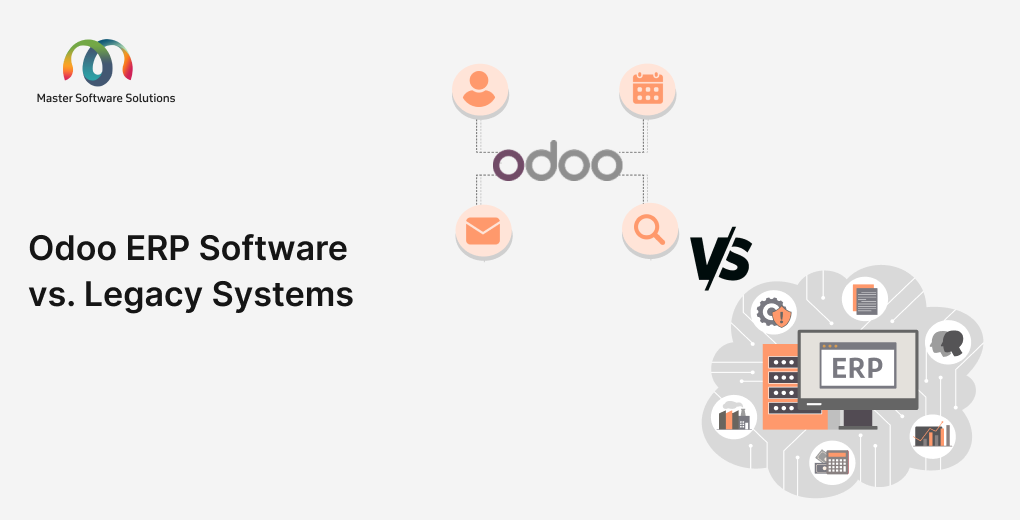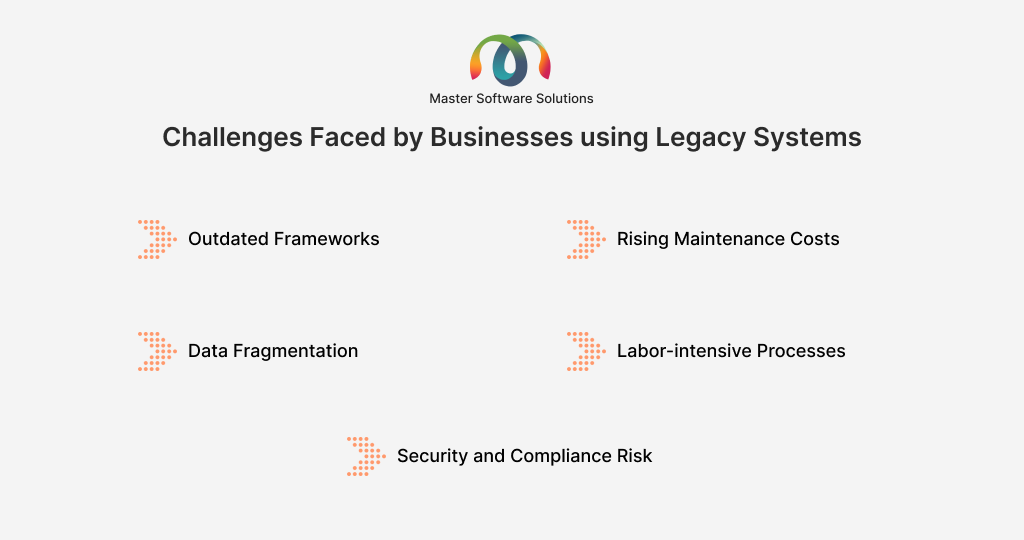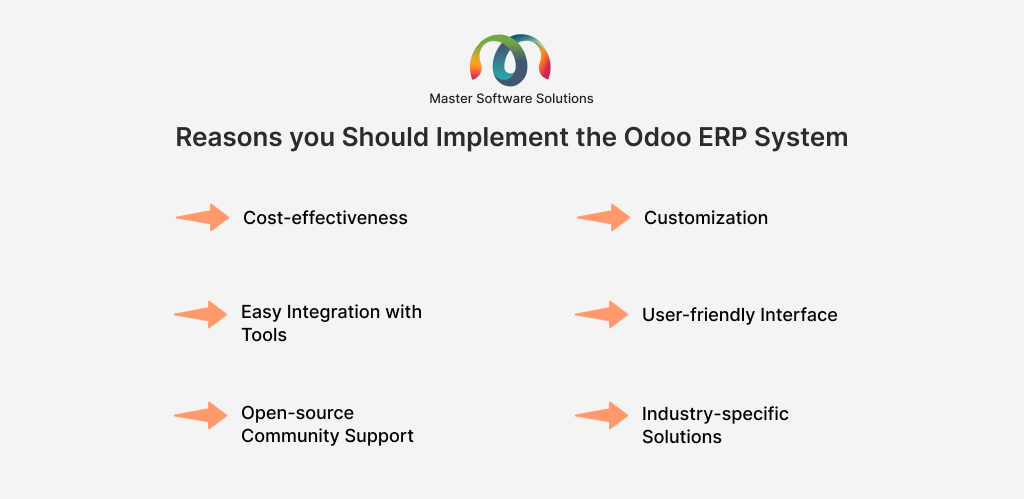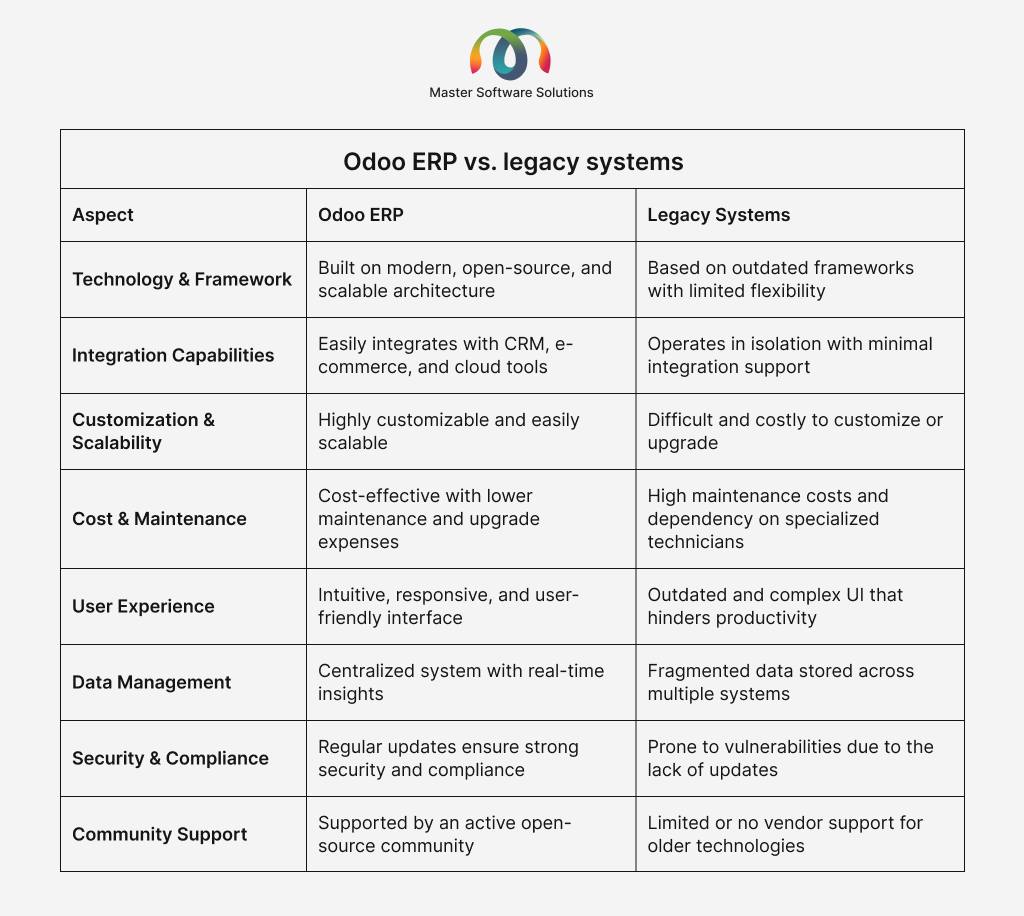You’ve probably noticed that your outdated systems are slowing down your business, yet the idea of migrating feels overwhelming. If you’re feeling the same way, then you are not alone. Many business owners felt that way before they actually migrated to Odoo ERP from their legacy systems.
This is where Odoo implementation partners, such as Master Software Solutions, come in. We are Odoo-certified partners who can help you seamlessly migrate from your old system to Odoo ERP software.
This blog compares legacy systems and modern Odoo ERP software, explaining why switching to a solution is crucial for staying competitive in the dynamic market landscape.
Table of Contents
What is Odoo ERP?
Odoo ERP software is a comprehensive enterprise resource planning system, especially designed to cater to small and mid-sized enterprises. It is an integrated platform that provides multiple business applications, also known as modules, including.
- Inventory Module
- CRM Module
- Finance and Accounting Module
- E-commerce Module
- Human Resource Module
- Sales Module
- Point of Sales Module
- Project Management Module
- Documents Module
- Planning Module
- Expenses Module
- Invoicing Module
- Product Lifecycle Management
- Purchase Module
- Helpdesk Module
Understanding legacy systems
Legacy systems are older software, hardware, or technology platforms that businesses continue to use despite the availability of newer, more efficient alternatives. Many organizations continue using legacy systems that once formed the backbone of their operations. They can still perform basic, essential tasks; however, they often hinder business growth, innovation, and efficiency. Here are the characteristics of legacy systems.
- Old technology – Built on outdated programming languages or platforms. For example, COBOL-based accounting systems or on-premise ERPs.
- Still functional – Still working, which is why companies hesitate to switch.
- Hard to update or integrate – Integrating with modern tools, cloud systems, or mobile apps is difficult.
- Costly to maintain – Requires more maintenance, specialized skills, or workarounds to keep running.
For example, A manufacturing company is using a 15-year-old on-premise legacy system to manage inventory and finances. It works, but it doesn’t support real-time analytics, mobile access, or cloud integrations.
Challenges faced by businesses using legacy systems
With an ever-changing market and evolving customer expectations, outdated tools are no longer effective. They have now become more of a liability than an asset, leading to operational inefficiencies, data silos, and increased risks. Here are the challenges a business faces with legacy systems.
Outdated frameworks
The legacy systems are often built on obsolete programming languages and outdated frameworks that lack compatibility with modern tools. This makes it difficult to introduce new features integrated with cloud-based tools or adopt automation technologies. As a result, businesses struggle to remain agile and competitive.
Rising maintenance costs
Maintaining old systems has become expensive. It is difficult and costly to find spare parts, skilled technicians, and support for older systems. These escalate expenses, diverting valuable resources away from innovation and digital transformation initiatives.
Data fragmentation
Legacy systems are typically isolated systems, which makes it difficult to achieve seamless data flow across departments. This results in fragmented data stored in multiple databases, complicating reporting, decision-making, and analytics. Businesses lose valuable insights due to the lack of unified and real-time data visibility.
Labor-intensive processes
Outdated systems require human intervention for basic operations such as data entry, order processing, and report generation. These processes are labor-intensive, slowing down productivity, increasing human errors, and preventing employees from focusing on more strategic tasks that drive business value.
Security and compliance risk
Legacy systems lack the necessary security features and compliance controls for strict regulatory environments. Unsupported software versions are vulnerable to cyber threats, data breaches, and compliance violations, exposing organizations to financial and reputational damages.
Why are modern ERP systems important for businesses?
Flexibility, efficiency, and scalability are the main focus points of any business. Modern Odoo ERP systems provide an integrated platform that connects all your business operations, enabling you to make data-driven decisions and achieve operational efficiency. Here are the reasons you should implement the Odoo ERP system.
Cost-effectiveness
Odoo ERP can automate repetitive tasks, minimizing manual errors and streamlining workflows, helping you reduce operational costs. Cloud-based deployment cuts down infrastructure and maintenance expenses.
Customization
The system offers high levels of customization, allowing businesses to tailor modules and workflows according to their specific operational needs and industry requirements.
Easy integration with tools
The Odoo ERP system seamlessly integrates with third-party applications, including IoT, payment gateways, and e-commerce platforms, ensuring a smooth data flow across departments.
User-friendly interface
They feature intuitive dashboards and easy navigation, making it easier for employees to adopt and use the system without extensive training.
Open-source community support
Odoo ERP is an open-source platform with active developer communities working to improve the system, add new features, and enhance security. This ensures innovation and reliability.
Industry-specific solutions
Odoo ERP software offers industry-specific modules that address the unique challenges of sectors such as manufacturing, retail, and logistics, thereby increasing efficiency and compliance.
Odoo ERP vs. legacy systems – difference
You may be wondering why Odoo ERP is worth implementing. Here are the key differences between the Odoo ERP system and a legacy system.
Technology and framework
Legacy systems
They rely on outdated programming languages and have a rigid architecture, which makes upgrades, integrations, and feature enhancements difficult. Businesses that employ these systems frequently struggle to keep up with technological advancements.
Odoo ERP
It is built in a modern, open-source architecture that supports flexibility, scalability, and integration with emerging technologies such as AI and IoT. The system is modular, allowing you to add and remove applications as your company grows.
Integration capabilities
Legacy systems
They often operate in isolation, creating data silos that prevent organizations from achieving end-to-end process visibility or cross-departmental collaboration.
Odoo ERP
Odoo can seamlessly integrate with a wide range of third-party applications, such as e-commerce platforms, CRM tools, accounting systems, and marketing automation software. Its API-driven framework enables smooth data exchange between departments and systems.
Customization and scalability
Legacy systems
They are rigid and not built for scalability. Attempting to customize or expand them requires extensive coding and can result in unstable systems.
Odoo ERP
It is a highly customizable platform. Odoo’s modular approach allows businesses to tailor workflows, dashboards, and reports to their specific needs. As a business grows, it can scale by adding new modules or functionalities without disrupting operations.
Cost and maintenance
Legacy systems
Legacy systems demand high maintenance expenses, both in terms of hardware and specialized technical expertise. The cost of maintaining outdated infrastructure often exceeds the benefits of keeping it operational.
Odoo ERP
It is cost-effective due to its open-source nature and modular structure. Businesses can start with essential modules and expand as needed, avoiding high upfront costs. Maintenance and upgrades are simple due to community and enterprise support.
User experience
Legacy systems
They have complex, text-heavy interfaces that are not user-friendly, causing inefficiencies and slower task execution.
Odoo ERP
It provides an intuitive and modern interface with easy navigation, responsive design, and dashboard-driven insights. This enhances user adoption and reduces training time. Employees can access odoo from anywhere on desktop or mobile, making it ideal for remote and hybrid work setups.
Data management
Legacy systems
They store data in separate silos, leading to duplication, errors, and a lack of actionable insights. Generating comprehensive reports or analytics often requires manual data consolidation, which is prone to errors and time-consuming.
Odoo ERP
The Odoo ERP system centralizes data across all business operations, including sales, inventory, accounting, HR, and manufacturing, into a unified database. This ensures data consistency, accuracy, and real-time visibility, helping businesses make informed decisions.
Security and compliance
Legacy systems
The legacy systems lack these modern security measures, making them vulnerable to cyber threats and compliance violations. Unsupported versions may also expose businesses to serious data and operational risks.
Odoo ERP
Odoo’s regular updates include advanced security patches and compliance features aligned with global standards, such as GDPR. Role-based access control and audit trails help ensure data protection and compliance.
Benefits of implementing Odoo ERP
Implementing Odoo ERP enables businesses to unify their operations, automate workflows, and make informed decisions through real-time data insights. Its modular and open-source nature allows companies to tailor the system to their unique needs. Below are some key benefits of implementing Odoo ERP.
Integrated data for unified operations
Odoo connects all your business departments into a single platform, ensuring consistent data flow and eliminating silos. This enables your teams to work collaboratively with access to accurate, real-time information.
Reduced operational expenses
Automating manual processes and improving workflow efficiency helps reduce the time and cost spent on repetitive administrative tasks. Businesses can reallocate resources to innovation and growth rather than system maintenance and error correction.
Process automation
Odoo automates key business processes, including order processing, invoicing, inventory updates, and customer communication. Automation minimizes human errors, accelerates task completion, and improves productivity across departments.
Supports growth
Odoo’s modular structure allows businesses to start small and expand as they grow. New applications or features can be added at any time without disrupting existing operations, ensuring scalability and long-term adaptability.
Robust security and compliance tools
Odoo can protect sensitive information with strong access controls, data encryption, and audit trails. Its regular updates and compliance features align with international standards, reducing the risk of data breaches and regulatory issues.
Streamlined supply chain management
Odoo enhances supply chain visibility by integrating procurement, inventory, and logistics modules. Businesses can manage demand forecasting, supplier relationships, and order fulfillment more effectively, reducing delays and stockouts.
Improved customer satisfaction
The system connects CRM, sales, and support modules, ensuring personalized customer experiences. Businesses can track interactions, respond quickly to inquiries, and maintain consistent service quality, leading to stronger customer loyalty.
Advanced analytics for strategic decisions
Odoo offers built-in dashboards and reporting tools, providing real-time insights into key performance indicators. Decision-makers can use these analytics to identify trends, monitor performance, and plan strategies based on accurate data.
Implementing Odoo ERP with Master Software Solutions
Master Software Solutions is an IT service-based company that offers end-to-end Odoo consulting services, including legacy system migration services. We can help you seamlessly migrate from your legacy system to Odoo ERP. If you need help migrating from your legacy system to the Odoo ERP system, we can help.
Contact us to discuss your business.



